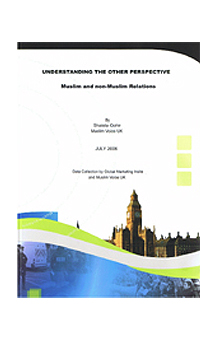
Author: Shaista Gohir
Publisher: Muslim Voice UK
Release Date: 1 Jul 2006
Format: Paperback
Pages: 124
Source: No longer available on the website
This publication documents the findings of an internet-based survey undertaken by Muslim Voice UK, Dr Colin Irwin (Queen’s University, Belfast) and Global Markets Insite Inc. in April-May 2006. The sample comprised three subsets, representing the general UK population (sample size 1002); the Muslim population (506) and the Jewish population (103). The survey set out to establish views in five areas: Islamophobia and the ‘clash of civilisations’, Discrimination and integration, the Muslim community, relations between the West and Muslim states, and Extremism and the ‘war on terror’.
The report states that “to carry out meaningful analysis when polling ethnic minorities, an adequate sample size is required. Typically, a minimum of 500 is required….however for the Jewish sample, it was only possible to poll 103 Jews. As this sample size is small the results should be treated with caution”. The report also notes that the survey would have excluded people without access to the internet and that 66% were university-educated. Though it does not clarify the steps taken to ensure persons did not make multiple entries, the author should be commended for transparency on the research design. The most reliable conclusions probably relate to what non-Muslims had to say about Muslims and Islam. The Muslim Voice UK report therefore is a contribution to the rapidly-increasing survey literature on Muslims in Britain particularly in the area of identifying issues on which there is either an alignment or dissonance in the thinking or perceptions of non-Muslims and Muslims in Britain.
The points of alignment are many. For example out of 21 different choices, both non-Muslims and Muslims most frequently selected the issue ‘all religions should be treated the same under British law’ as ‘essential’. This is interesting as at present there is an anomaly in the law, with Jews and Sikhs – deemed ethnic groups – afforded greater protection under the incitement to racial hatred legislation. This law offers protection from insulting and threatening behaviour, which has been excluded from recent legislation relating to incitement to religious hatred – which offers protection to Muslims – on the grounds of protecting freedom of expression.
Both non-Muslims and Muslims most frequently cited the factor ‘civilizations of the West and Muslim world should appreciate their differences and learn from each other’ as the one ‘essential to improve understanding – 46% for non-Muslims and 71% for Muslims. However a follow-up question indicated that many non-Muslims have less of a willingness to become engaged in this process: only 9% deemed it ‘very significant’ that there was a ‘failure of non-Muslims to appreciate the contribution of non-Muslims to appreciate the contribution Muslims have made to civilisation’. Thus the sense of tolerance is accompanied by a stand-offishness and insularity. It is therefore important for Muslims involved in outreach work to take account of these attitudes.
There is agreement on the issue of ‘misrepresentation of Islam by minority Muslim groups to justify violence’. Non-Muslims most frequently cited this as a ‘very significant’ problem (46%), which was matched by Muslims as well (51%). The study also offers hope on the emergence of shared values of mutual civility: 43% of non-Muslims stated that it was ‘essential’ that ‘Muslims should not condemn difference but accept it with courtesy’ – a view with which 49% of Muslims concurred.
Almost similar proportions of Muslims and non-Muslims agreed that it was ‘essential’ that groups that incited hatred and violence in the UK should be banned (52% and 57% respectively).
Some points of dissonance: Only 7% of non-Muslims considered it ‘very significant’ that there was a ‘failure of government to protect the human rights of Muslims; for Muslim respondents, the comparable figure was 51%. Similarly only 6% of non-Muslims considered it ‘very significant’ that there was discrimination against Muslims by the Police; 30% believed that this statement is ‘not even true’. In contrast, 32% of Muslims consider police discrimination ‘very significant’, and only 5% state that it is ‘not even true’. Thus attitudes towards the criminal justice system are diametrically opposed.
There is also a much stronger perception amongst non-Muslims that it is right to blame Muslims for the London bombings. This is the impact on the man in the street of the continued Government rhetoric that the Muslim community and its institutions have been soft on extremism. Thus while 66% of Muslims ‘strongly agree’ that they have been ‘unfairly blamed for the London bombings’, only 23% of non-Muslims share this view’. Almost 1 in 2 non-Muslims believes it is OK to apportion blame in this way, or are ambivalent.
The Muslim Voice UK survey has also uncovered marked differences in response to factors significant to relations between the West and the Muslim world. The factor most cited as ‘very significant’ by non-Muslims was ‘suicide bombings that kill Israeli civilians’ (50%); for Muslims the most cited ‘very significant’ factor was the invasion of Iraq (80%). Interestingly, 38% of non-Muslim respondents considered it ‘essential’ that all UN resolutions should be enforced ‘without favour or discrimination while only 2% deemed this unacceptable. Moreover 48% of non-Muslims considered the proposition that Israel should be exempted if the Middle East was made a nuclear-free zone as ‘unacceptable’. There the public seems to have retained a sense of fair play, if not our Government.
